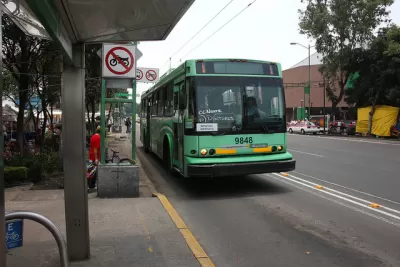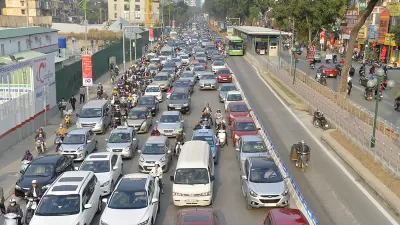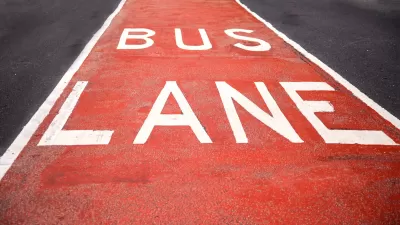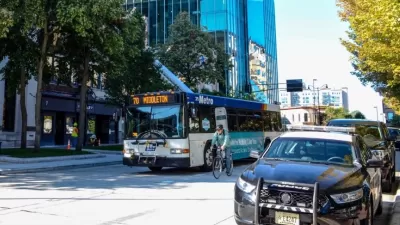The curious and, at times, dangerous design of bus lanes that move against the flow of traffic in Mexico city will be expensive and time-consuming to take out, so the city looks for ways to work with what it has.

Mexico City's buses sometimes drive in their own lanes in the opposite direction of traffic on one-way streets. The design was created in the '70s when the city was looking for ways to increase the throughput of private vehicles. The one-ways allow for wider lanes and higher speeds, and accommodate bus travelers who would have to walk to more distant one-way streets to catch a bus.
So the city built bus-only lanes for buses to go in the opposite direction of traffic. A problem with this design is that drivers sometimes do not recognize the uncommon design and pull into the lane of the oncoming bus. "World Resources Institute, a research organization that found a 146 percent increase in pedestrian crashes and a 35 percent increase in vehicle collisions in counterflow lanes," Natalie Schachar reports in CityLab. Unfortunately, updating these streets would cost $6 million per kilometer. "For now, the next best solution appears to be optimizing bus corridors by installing better signaling, mid-block crossings, and physical barriers to prevent vehicles and pedestrians from straying into the wrong lane," Natalie Schachar writes.
FULL STORY: Why Mexico City Has Counterflow Bus Lanes

Maui's Vacation Rental Debate Turns Ugly
Verbal attacks, misinformation campaigns and fistfights plague a high-stakes debate to convert thousands of vacation rentals into long-term housing.

Planetizen Federal Action Tracker
A weekly monitor of how Trump’s orders and actions are impacting planners and planning in America.

In Urban Planning, AI Prompting Could be the New Design Thinking
Creativity has long been key to great urban design. What if we see AI as our new creative partner?

California Creates Housing-Focused Agency
Previously, the state’s housing and homelessness programs fell under a grabbag department that also regulates the alcohol industry, car mechanics, and horse racing.

Chicago’s Ghost Rails
Just beneath the surface of the modern city lie the remnants of its expansive early 20th-century streetcar system.

Baker Creek Pavilion: Blending Nature and Architecture in Knoxville
Knoxville’s urban wilderness planning initiative unveils the "Baker Creek Pavilion" to increase the city's access to green spaces.
Urban Design for Planners 1: Software Tools
This six-course series explores essential urban design concepts using open source software and equips planners with the tools they need to participate fully in the urban design process.
Planning for Universal Design
Learn the tools for implementing Universal Design in planning regulations.
planning NEXT
Appalachian Highlands Housing Partners
Mpact (founded as Rail~Volution)
City of Camden Redevelopment Agency
City of Astoria
City of Portland
City of Laramie





























